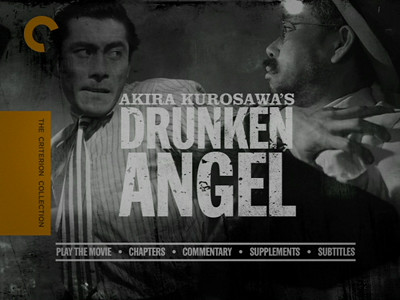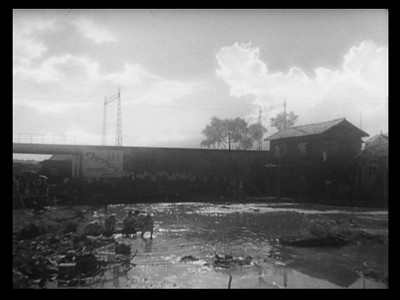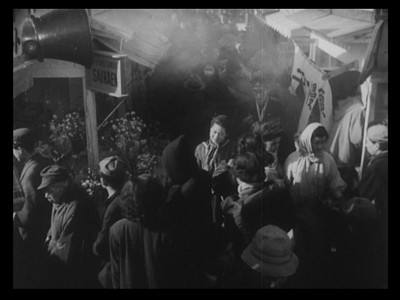
Akira Kurosawa's 1948 crime drama Drunken Angel is a hardboiled picture of a different hue. Not as hard as it is boiled, a lot heavier on the drama than it is the crime. Yet, like many an American gangster picture, Drunken Angel does steer its camera into the lower depths where the poor are subject to the selfish whims of thugs and gangsters. Here, though, the scenario that Kurosawa and co-writer Keinosuke Uekusa have dreamed up applies a more literal, more grave sense of life and death that exposes the meanest that the mean streets has to offer. They force their lead yakuza to question the consequences of his actions in ways that make the criminal posturing and his code of honor seem like child's play.
The Drunken Angel of the titled is an alcoholic doctor who works in the Tokyo slums. Dr. Sanada, played by Kurosawa-regular Takashi Shimura, is dedicated to helping people, even if the cantankerous old coot does need a few stiff belts off a bottle to get him through the day. Sanada is a walking, talking object lesson in making the right choices, and he drums into his patients that their continued well-being is up to them, not up to medicine or his treatments. And he should know. Sanada had very opportunity to be a successful doctor. His schoolmate, Takahama (Eitaro Shindo), runs a respected clinic not too far from Sanada's rundown offices. While Takahama was studying, Sanada was chasing women and drink. He got through his schooling, but only just, leaving him with opportunities as limited as the people he helps. In one early scene, Sanada chases a group of kids away from a toxic "lake" that they keep trying to swim in. Little more than a sinkhole, it reflects their poverty and disgrace back at them. Each man or woman who peers into its filthy waters over the course of Drunken Angel will see their life's ailment floating in the mire.

In its way, it's an ironic twist of fate. As Sanada's nurse, Miyo (Chieko Nakakita), observes, there are few doctors who are as vigilant about chasing down their patients as Sanada is, so why should he be so far removed from the resources available to the less dedicated? She knows a little bit about how Sanada is willing to go above and beyond, as she came to work for him when she had contracted VD from her yakuza boyfriend, a violent underboss named Okada (Reizaburo Yamamoto). It's been three years since Sanada first offered her shelter, on the eve of Okada being sent to jail for mutilating another man, and Sanada is still as vehemently opposed to Miyo's relationship with him now that Okada's release day approaches.
Coincidentally, the end of Okada's sentence coincides with the arrival of a new patient, and Sanada must wrestle with this obstinate intrusion. Matsunaga, played by the great Toshiro Mifune, is introduced to us in the first scene when he stumbles into Sanada's office in the middle of the night. He claims to have hurt his hand on a door, and when the doctor inquires as to why he is bleeding, he adds there was a nail sticking out of it. When Sanada pulls a bullet from Matsunaga's wrist, he notes what a funny looking nail it appears to be. Sanada has little time for hoods, and the old sot has no fear of letting said hoods know. He scolds Matsunaga and stitches his wound without using painkillers. Unfortunately, he also detects a hint of tuberculosis in the gangster's cough. When the doc suggest to the crook that he might be fatally ill, Matsunaga grows angry, leading to the first of many violent arguments between them.

Kurosawa is making no bones about how he feels about the criminal element in Drunken Angel. Though there appears to be a tendency to compare this film to film noir--the back cover goes so far as to even call it an "early noir," which doesn’t make a whole lot of sense since the movie was made in the middle of what is the traditional, and for my money only, noir period--you have to stretch the particulars pretty thin to make a connection. Drunken Angel is far more hopeful than your average noir, and though Sanada's troubled past gives him something in common with many a noir anti-hero, he is never drawn back into his wanton ways. (In fact, at the end, do we see him considering taking a bottle from the bag of the barmaid and then resisting, suggesting the doc has sobered up?) More importantly, though, for all of the "crime does not pay" sloganeering the censor board forced on Hollywood directors, there still was always an underlying glorification of the bad guys.
There is no such affection on the part of Kurosawa. Sanada acts as the director's mouthpiece, and his main objection to Matsunaga's lifestyle is that it's a cop-out. It takes more guts to stand up and take life on the chin than to bully your way through it, and the gangster is showing his true mettle, or lack thereof, in how he chooses to deal with his TB. In comparison to the teenage girl (Yoshiko Kuga) that Sanada has been helping beat her disease, Matsunaga has no guts at all. His embracing a romantically existential worldview that all men will die and you might as well go out enjoying yourself doesn't impress Sanada one bit. Not when he can follow doctor's orders and come out of the TB completely healed.

To give this message more weight, Kurosawa might have considered casting a different actor than the wolfish Mifune, whose good looks and undeniable charisma can sway even the most jaded cinephile to his side. Then again, maybe Kurosawa was aware of this, hence Sanada's lament that all the women of the area seem to fall for the yakuza despite his having nothing to offer them but misery and death. Kurosawa was giving us the rakish idol we so love, and then forcing us to watch him deteriorate. Matsunaga blows into Sanada's office like a force of nature, the Mifune wind machine turned up to full bluster. By the end of Drunken Angel, however, he has completely fallen apart. He is coughing up blood and he looks like the walking dead. Kurosawa is practically taunting his viewer. "This is the man you so worshipped?" He is helped by the fact that Takashi Shimura is one of the few actors that could hold his own opposite Mifune, and this is just one of many couplings of the two under Kurosawa's authority. The two actors balance each other out well. Shimura is grounded and soothingly predictable whereas Mifune is wild and loose.
There is an interesting criss-cross in the middle of Drunken Angel. Though Sanada has spent the first half of the picture trying to convince Matsunaga to submit to his age and wisdom, he stubbornly refuses until midway. As he does, another older man enters the scene and schools another younger man. Throughout the early part of the movie, a man (Sachio Sakai) has been sitting across the way from Sanada's office and playing his guitar, providing a live score for the movie. Just as Matsunaga is giving in to Sanada, the newly sprung Okada is demanding the guitarist hand over his instrument. He announces his return by playing his favorite song, something called "Killer's Lullaby," and instructing the guitarist that it's a song he should learn. It's a forceful entrance and a forceful move, Okada asserting his influence with quiet words and understated gestures, seemingly succeeding where Sanada's shouting insistence has failed. Okada's arrival signals a shift. He will also be taking control of Matsunaga, and Drunken Angel will now see the violence that has been bubbling under the surface of its poisonous lake emerge.
From here, the movie essentially becomes a wrestling match for Matsunaga's life. Will he go with the doctor and make the smart, healthy decision, or will he let Okada destroy him? The fabled yakuza honor is quickly exposed when Okada takes Matsunaga's girl, the cocktail dancer Nanae (Michiyo Kogure)--though at least we get a pretty wild dance-off in the process! In another reversal, Matsunaga stands up to protect Okada's former lady, Miyo, from the abuser. Matsunaga's ejection from the organization is proof positive of everything Sanada has been saying about the men his troublesome patient chooses to associate with. There is no loyalty, no values, just selfish gain. To further drive this home, Kurosawa choreographs the knife fight between Matsunaga and Okada as a slow, clumsy series of tumbles and falls. Matsunaga can barely keep from vomiting, and Okada is cowardly and comical. The sequence purposely lacks dazzle, with Kurosawa only getting flashy when he pulls off an amazing dolly shot chasing a fleeing Matsunaga down a hallway; thus, the most animated emotion in the whole battle is fear. When faced with the real possibility of death, the tough guy isn't so tough. He spills a paint bucket, and he and Okada slip and slide in it, staining themselves with their own shame.

In the end, then, it's Doctor Sanada who perseveres, as bittersweet as that survival may be. As the one man who is true to himself, accepting his fate and his failure but still struggling against the tide of his own perceived nature, he can't accept the loss of any patient. Sure, there is still the schoolgirl whose clear x-ray strikes a balance that Sanada should be happy with, but his joy, however authentic, still seems a little forced. Which I guess is maybe one place where the noir tag might fit. A noir ending, when it goes right, is only a grain of goodness on a beach of badness. It's a victory of the here and now, and singular to those who have achieved it, but like Sanada and the schoolgirl, it disappears in the crowd as the rest of humanity struggles on.


1 comment:
Tournament pools are illegal if a fee is required or accepted to enter. The method these pools are set up violates Minnesota’s playing laws—Since these pools are organized and systematic, and winners obtain something value value, they are in opposition to the legislation. A legal tipboard ticket is a folded or banded single ticket that sometimes conceals one number or set of symbols. Illegal tipboard tickets sometimes conceal a set of two numbers that are used to characterize the scores of the sports recreation being wager on. The licensed retail alcoholic beverage establishment does not arrange or take part financially in the video games. With respect to Texas Hold'em, the legislation further specifies that the worth of all prizes awarded to an individual https://thekingofdealer.com/jumbo-casino/ winner of a match at a single location could not exceed $200 per day.
Post a Comment